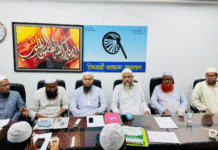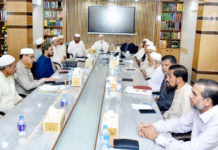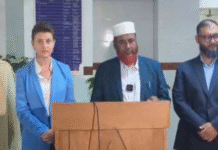Bangladesh’s digital security act: old wine in new bottle?
Reporters’ groups demand changes to law that retains ‘worst parts’ of former act and poses threat to freedom of speech

Bangladeshi journalists form a human chain in Dhaka as they protest against attacks and abuses of reporters on Aug. 7. Rights groups and media personnel say some provisions of the recently passed Digital Security Act 2018 pose a risk to journalists and are ripe for abuse. (Photo by Stephan Uttom/ucanews.com)
Bangladesh’s parliament passed the Digital Security Act 2018 on Sept. 19, ignoring opposition from journalists and rights watchdogs who objected to its controversial provisions.
Critics see it as being repressive and ripe for abuse as it paves the way to curtail both freedom of expression and freedom of the press. It includes severe penalties for cyber terrorism and other crimes committed online.
The government said the law aims to curb a rise in cybercrime and violent extremism in recent years.
But the new legislation has already become a bone of contention due to what it could entail for the media in terms of hindering their reporting and punishing them for crossing certain lines.
For example, Section 32 states that anyone who illegally enters the offices of the government, semi-government or autonomous bodies to gather information, and uses an electronic device to covertly record this, can face up to 14 years in jail, a fine of up to 2 million taka (US$24,000), or both. Meanwhile, Section 43 allows police to search and arrest anyone without a court warrant.
Top of Form
Sign up to receive UCAN Daily Full Bulletin
Bottom of Form
The government moved ahead with the new law after facing a barrage of criticism both at home and abroad for the widespread abuse and harassment of journalists, dissidents and critics.
This was taking place under the already repressive provisions of the Information and Communication Technology Act (ICT) 2013, notably Section 57.
Pundits say the government has moved to disband this controversial section of the ICT Act, only to reintroduce similar provisions under the new law in a reformatted fashion.
In protest, members of the Bangladesh chapter of the Berlin-based anti-corruption watchdog Transparency International (TIB) staged a human chain in Dhaka on Sept. 26 and released a statement clarifying their concerns.
Terming the Digital Security Act a “black law,” the TIB has appealed to President Abdul Hamid to not sign off on the law despite parliament giving it the nod. The group requested that it be sent back for a review, with the necessary amendments made to the “controversial and risky” sections.
“Freedom of expression, the right to information and freedom of speech are basic rights guaranteed in the constitution. The Digital Security Act also conflicts with the Right to Information Act, which is an effective tool to ensure accountability of state institutes, officials and elected public representatives,” TIB executive director Iftekharuzzaman said during the rally.
“This act is ripe for abuse and it will not only curb freedom of speech but impede investigative and independent journalism and research.”
In a press statement issued on Sept. 24, New York-based Human Rights Watch (HRW) said the law is overly broad and seems designed to silence government critics.
“[It] is a clear violation of the country’s obligations under international law to protect free speech,” Brad Adams, Asia director at HRW, said. “With at least five provisions criminalizing vaguely defined types of speech, the law is a license for wide-ranging suppression of critical voices.”
The law retains the most concerning provisions of the ICT Act and adds more clauses that criminalize peaceful speech, the statement added.
The Editors’ Council, a forum of major newspaper editors in Bangladesh, said its members would form another human chain in a protest in front of the National Press Club in Dhaka on Sept. 29.
The editors released another statement on Sept. 22 expressing their “deep regret” at the passage of the new act, the Dhaka Tribune reported.
Amid mounting opposition, Information Minister Hasnul Huq sent letters to the Editors’ Council, the Bangladesh Federal Union of Journalists (BFUJ) and Dhaka Reporters’ Unity (DRU) urging their leaders to cancel the planned rally and discuss their concerns with him on Sept. 30.
Holy Cross Father Liton Hubert Gomes, secretary of the Catholic Bishops’ Justice and Peace Commission, said this shows the government is beginning to appreciate the gravity of the matter and how unfair and potentially dangerous the new law is.
“This is a black law that conflicts with people’s constitutional rights in this independent and democratic country. The news that the government will have a sit-down with journalists is welcome. I think they’ve realized the law is unfair. It has to be reviewed and changed,” Father Gomes told ucanews.com.
Monjurul Ahsan, former president of the BFUJ, said not all parts of the law were unwelcome; rather, it needs crucial tweaks and some parts removed.
“This is not altogether a bad law but some provisions are dangerous for journalists and must be changed. We praise the government for taking the initiative in holding this meeting,” he said. “Personally, I have high hopes of us reaching a consensus to resolve this.”
The sooner the government realizes the risks built into this “horrendous” law, the better, said Baki Billah, a prominent blogger and activist.
“Democracy cannot thrive without freedom of expression and freedom of thought, both of which are shrinking in Bangladesh on a daily basis due to abuse by both state and non-state actors, including attacks by religious extremists,” he said.
“This is a horrendous law in terms of putting a gag on free speech. In the long run it could be devastating for our fledgling democracy.”
According to last year’s Impunity Index by the New York-based Committee to Protect Journalists (CPJ), Bangladesh was ranked the 10th most deadly place in the world for journalists to work.
The press is “partly free” in Bangladesh and political rights and civil liberties respected to a degree, according to a more recent report this year by Freedom House, a Washington-based media freedom watchdog.









